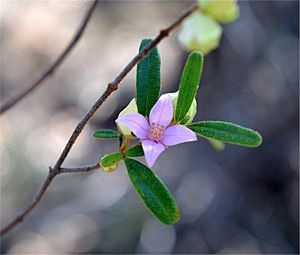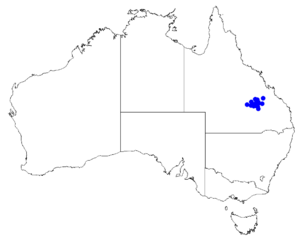Boronia duiganiae facts for kids
Quick facts for kids Boronia duiganiae |
|
|---|---|
 |
|
| Boronia duiganiae in the Carnarvon Station Reserve | |
| Scientific classification |
|
| Kingdom: | Plantae |
| Clade: | Tracheophytes |
| Clade: | Angiosperms |
| Clade: | Eudicots |
| Clade: | Rosids |
| Order: | Sapindales |
| Family: | Rutaceae |
| Genus: | Boronia |
| Species: |
B. duiganiae
|
| Binomial name | |
| Boronia duiganiae Duretto
|
|
 |
|
| Occurrence data from Australasian Virtual Herbarium | |
| Script error: The function "autoWithCaption" does not exist. | |
Script error: No such module "Check for conflicting parameters".
Boronia duiganiae is a special plant that belongs to the citrus family, called Rutaceae. You can only find it growing naturally in the mountains of south-east Queensland, Australia. This plant is a shrub that stands tall with many branches. Its leaves can have one, three, or five small parts called leaflets. When it blooms, it has pretty pink to white flowers, each with four petals.
What it Looks Like
Boronia duiganiae is a shrub that grows upright and has many branches. It can reach about 2.0 m (7 ft) tall. Its younger branches are covered with thick white or yellow hairs.
The leaves are made up of smaller parts called leaflets. Each leaf can have one, three, or five leaflets. The stem that holds the leaf (called a petiole) is about 2–8 mm (0.08–0.3 in) long. The leaflet at the very end of the leaf is usually 6–31 mm (0.2–1 in) long and 3–12 mm (0.1–0.5 in) wide. The leaflets on the sides are a bit smaller.
These leaflets are shaped like an oval or a spear, with the narrower part at the bottom. Their undersides are very hairy.
The flowers are pink to white and grow in groups of up to three. They appear where the leaves meet the stem, on a small hairy stalk about 0.5–1 mm (0.020–0.039 in) long.
Each flower has four sepals, which are like small leaves that protect the bud. These sepals are egg-shaped or triangular, about 3.5–5 mm (0.14–0.20 in) long and 2–3 mm (0.079–0.12 in) wide. They are hairy on their bottom surface. The four petals are 6–11 mm (0.24–0.43 in) long and 3–6 mm (0.12–0.24 in) wide. Inside the flower, there are eight stamens, which are also hairy.
This plant usually flowers from February to November. After flowering, it produces small fruits that are about 4–5.5 mm (0.16–0.22 in) long and 2–3 mm (0.079–0.12 in) wide.
Name and Discovery
The plant Boronia duiganiae was officially named in 1999. It was described by a scientist named Marco F. Duretto. He published his description in a science journal called Austrobaileya. The first plant used to describe the species was found near Rolleston.
The second part of its scientific name, duiganiae, was chosen to honor an Australian scientist named Suzanne Duigan. She was a palaeobotanist, which means she studied ancient plants from fossils.
Where it Lives
You can find Boronia duiganiae growing in forests and woodlands. It prefers areas with sandstone rocks. These places are found in the mountain ranges south and south-west of Rolleston and Springsure in Queensland.
How it's Protected
The Queensland Government has a law called the Nature Conservation Act 1992. Under this law, Boronia duiganiae is currently listed as "least concern." This means that the plant is not in immediate danger of disappearing.
 | George Robert Carruthers |
 | Patricia Bath |
 | Jan Ernst Matzeliger |
 | Alexander Miles |

